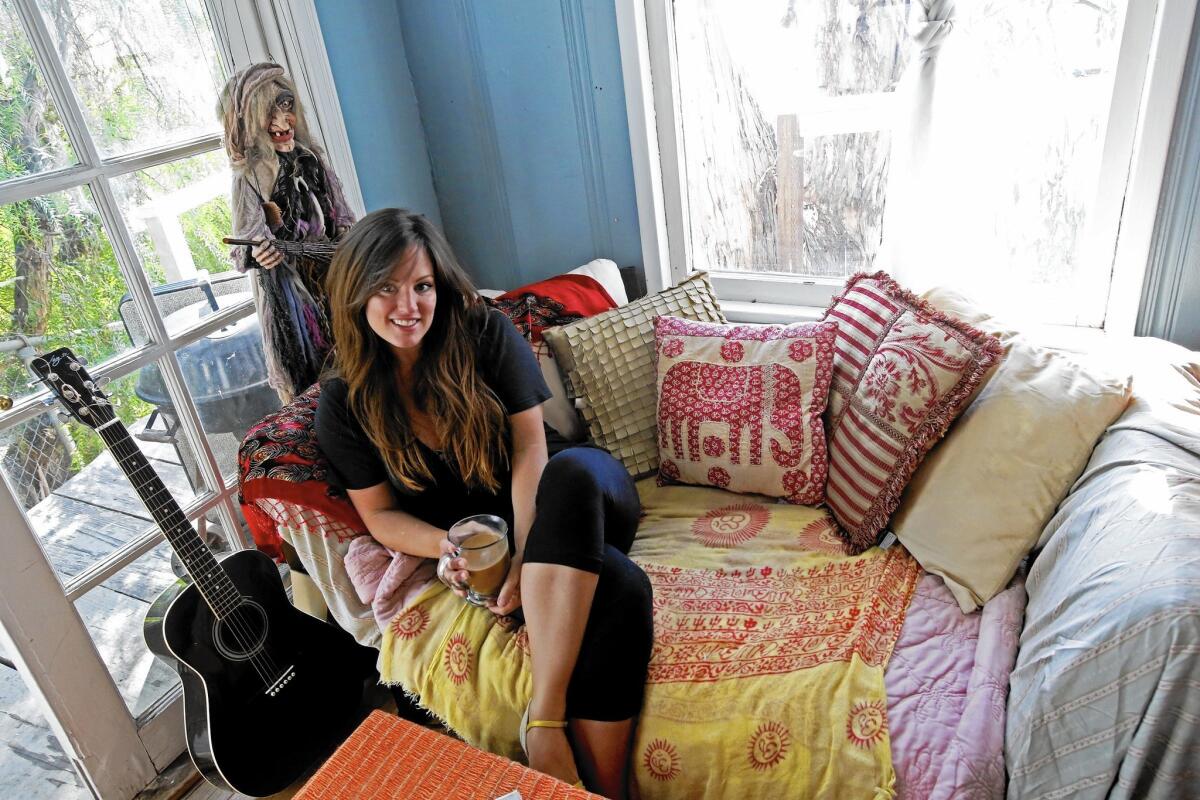At Airbnb, growth brings scrutiny, regulation

Airbnb touts “home sharing” in its ads and political campaigns, but nearly two-thirds of its listings in L.A. and other big markets are for whole units. Above, Hope Arnold is shown in 2013 on the couch she slept in when renting out her bedroom in Silver Lake.
Airbnb started with three air mattresses on the floor of a San Francisco apartment. Seven years later, it’s worth as much as Marriott.
The short-term rental giant, which connects travelers with spare bedrooms or entire homes, has raised enough investor money to value the company at $20 billion. Airbnb “hosts” now list 1.2 million rentals worldwide.
Now the Silicon Valley firm finds itself caught between investors’ appetite for fast growth and rising protests over its effect on neighborhoods and hotel jobs. The company’s swift rise has come in a regulatory gray zone, avoiding the strict rules governing hotels or traditional landlords.
Airbnb continues to promote an image of helping mom-and-pop homeowners raise a little extra cash, but its platform has drawn far bigger operators who buy properties to rent out full-time. That’s brought both profits and headaches, particularly as the company considers an initial public offering that could bring even more pressure for growth.
Cities from New York to Santa Monica are trying to figure out how best to zone, tax and oversee this new industry. As they do, they’re getting an earful from hotel workers’ unions worried about the effect on their jobs, housing advocates worried about a shortage of affordable apartments, and neighbors wary of strangers on their block every day.
Airbnb has responded with a battalion of lobbyists, especially in big states such as California and New York, along with beefed-up PR operations. It has hired veterans of Silicon Valley, the Obama administration and big labor unions.
To Nathan Blecharczyk, one of the trio of Airbnb co-founders who still run the company, these are good problems to have. It was just seven years ago that his friends Brian Chesky and Joe Gebbia laid out those air mattresses for people coming to a San Francisco design conference. Now, every night, 400,000 people use their website to do something similar.
Like Google and Uber, Airbnb has even achieved that emblem of digital age ubiquity: Its name has become a verb.
“When we started, everyone thought you’d be crazy to allow strangers to stay in your home,” he said. “Now all the fear is that everyone is doing it. It shows the power of this concept, and the opportunities here.”
But for the company’s many critics, these questions cut to the core of Airbnb’s business model, and in some ways to the entire concept of the so-called sharing economy, which includes rising car-sharing giants such as Uber that also face vexing regulatory battles.
To Steve Unger, a Portland, Ore., innkeeper who writes a blog on the short-term rental industry, it’s like Airbnb is two companies.
One is what Unger calls “Good Airbnb.” That’s a website that enables people to rent out spare bedrooms for extra cash and meet interesting travelers over homemade pancakes. This is what you see in the company’s ads and hear from the hosts Airbnb brings to testify at public hearings.
Then there’s “Bad Airbnb,” a platform that allows landlords to easily rent whole apartments or homes to a parade of strangers, taking them off the traditional housing market entirely. They operate as unlicensed hotels where who-knows-what might happen, and nobody seems to be responsible.
“I’d like to see the Good Airbnb flourish,” he said. “I’d like to see the Bad Airbnb go away.”
The thing is, Bad Airbnb makes a lot of money.
The company charges a 9% to 15% fee on each listing, making bigger rentals a lot more profitable. On a $360-per-night three-bedroom apartment in Venice, for instance, Airbnb’s cut on a two-night stay in June would be more than $100. Rent the same dates in a $95-per-night spare bedroom nearby, and the company collects just $29.
While the company touts “home sharing” — the spare-room rental — in its advertising and political campaigns, nearly two-thirds of listings in L.A. and other big markets are for whole units, according to a recent study by the Los Angeles Alliance for a New Economy, a labor-backed think tank. Those units generate 89% of the company’s revenue in Los Angeles, the organization estimates.
Airbnb disputes the the group’s study, but observers say its findings suggest the company has little interest in reining in full-time operators.
“Airbnb profits from transactions,” said Yassi Eskandari-Qajar, city policies program director at the Sustainable Economies Law Center in Oakland. “There’s no incentive for them to put limits on how many people can do this, how much they can charge or how many homes they list.”
But, she notes, Airbnb is mindful of political pressure. And when pushed, it has agreed to changes.
It has worked out deals to collect taxes — which are typically left up to hosts to pay — in several cities, including Malibu. In April, amid protests in Venice, it booted about a dozen large full-time rental firms from its site in Los Angeles. Now, it’s trying to forge compromises with officials in a number of cities across the country, including L.A., over new regulations.
“There’s a perception out there that Airbnb doesn’t want there to be rules. We think rules would be fantastic,” Blecharczyk said. “We think rules would help our community, but not necessarily the rules that have simply existed for decades.”
Airbnb is trying to tell its own story. The company has dispatched a team of community organizers in L.A. and elsewhere to help mobilize hosts that best reflect the “Good Airbnb.”
One afternoon last month, dozens of hosts showed up on the lawn outside Santa Monica City Hall for a rally against a law banning full-unit short-term rentals. They hoisted signs like “Home Sharing = Affordable Housing” and “Let Us Host” and eagerly shared their experiences.
Mary Williams was there. A single mom who lives in Century City, she rents out her converted garage on Airbnb. It helps pay the bills, she said, and she meets lots of interesting people, like the Australians who were staying there the week of the Santa Monica rally.
Putting a friendly face on Airbnb helps policymakers and critics alike understand it, said Williams, who has spoken several times to neighborhood councils that were considering anti-short-term-rental measures. When they meet the real people the company helps, she said, many opponents change their minds.
“City councils are starting to get it,” she said. “Before, there was a lot of ignorance. But we’re getting the message through.”
They didn’t get it in Santa Monica. That night, the City Council unanimously passed one of the toughest short-term rental laws in the country, rendering about 70% of units listed in the city illegal. It’s a law Airbnb can’t afford to see duplicated in other cities.
Now, Manhattan Beach is considering a similarly strict measure, and the Los Angeles City Council is weighing a proposal that would bar people from listing short-term rentals of units that are not their primary residence, a rule meant to prevent homes from being bought up and run like hotels.
The company has a fine line to walk between getting right with the law and squelching its own growth, especially if it plans to go public.
Any successful public stock offering would hinge on continued rapid growth. At $20 billion, the company’s purported valuation is already a rich sum for the market to swallow, said Sam Hamedah, chief executive of PrivCo, a private company research firm.
Airbnb’s closest publicly traded rival, vacation rental site Homeaway, clocks in at less than $3 billion. Hamedah says he’s seen Airbnb’s number of listings flatten out lately. Investors — and maybe federal securities regulators — will have a problem with the fact that most of its listings in big cities may be technically illegal.
“An IPO filing would have more red flags than a military parade,” he said.
Blecharczyk says the company has no “near-term” plan to go public. Its investors, he said, take the same long-term view as its executives.
“They’re not so concerned about what happens next year,” he said. “They’re looking at 10 years out.”
In the 10-year plan, as Blecharczyk sees it, these tensions will all get worked out. Battles with unions and regulatory defeats like Santa Monica will end up looking like bumps in the road. Sensible regulations will be crafted. More people will become more comfortable with the concept. And the company that evolved from three air mattresses to a controversial adolescence will emerge as a permanent pillar of a global sharing economy.
“We believe very strongly that there’s a great value here for guests, for hosts and for cities,” he said. “It may take time for that to be recognized. But we think people will come around.”
More to Read
Inside the business of entertainment
The Wide Shot brings you news, analysis and insights on everything from streaming wars to production — and what it all means for the future.
You may occasionally receive promotional content from the Los Angeles Times.











